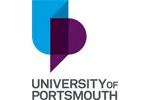We're moving! This site will be relocating to goingto.university in 2026. Please update your bookmarks to the new address.


the United Kingdom
University of Portsmouth| The award | How you will study | Study duration | Course start | Domestic course fees | International course fees |
|---|---|---|---|---|---|
| BA (Hons) | Full-time | 1 - 2 year | September | - | - |
Overview
Build on your previous higher education studies to gain a full BA (Hons) degree in finance and business communications in just 1 or 2 years.
This degree combines English language improvement with the study of finance.
You can do this undergraduate degree in 1 year or in 2 years, depending on your level of previous study and your ability to write and speak English.
Eligibility
This course is open to international, EU and UK students whose first language is not English. A key part of the course is improving your written and spoken business English.
Course highlights
Accreditation
This course is accredited by the Chartered Institute of Management Accounting.
Careers and opportunities
Graduates of this course have gone into careers such as:
Postgraduate study
Many graduates of this course go on to postgraduate study on master's courses such as MSc Forensic Accounting or MSc Finance. As a graduate of Portsmouth you may be able to get a scholarship or a reduction on your postgraduate tuition fees if you continue your studies with us.
Set up your own business
We're an endorsing institution for UK start-up visas, so we can offer you lots of help and support if you want to stay in the UK after you graduate and set up your own business.
https://www.port.ac.uk/study/undergraduate/undergraduate-fees-and-student-finance
Only those who have previously studied at higher education level should apply.
Applicants for the 2 year course require relevant HE study leading to a Level 4 qualification, for example an appropriate HNC, or 120 credits from year 1 of an undergraduate degree (BA/BSc), in a relevant subject.
Applicants for the 1 year course require relevant HE study leading to a Level 5 qualification, for example an appropriate HND, foundation degree or Advanced Diploma, or 240 credits from year 1 and year 2 of an undergraduate degree (BA/BSc), in a relevant subject.
For year 2 entry applicants require English language proficiency at a minimum of IELTS band 5.5 with no component score below 5.5. For year 3 entry applicants require English language proficiency at a minimum of IELTS band 6.0 with no component score below 5.5.
Below are some suggested courses at other providers that you may also be interested in:
Preparatory Courses in English for Degree Studies (Medical, Business, Architecture and Engineering, Psychology, English and American Studies) UG:Foundation, UG:Foundation, UG:Foundation
University of Pécs
Find out moreConsider a Foundation or Pathway course at University of Portsmouth to prepare for your chosen course:
If you do not meet the entry requirements for this course then consider one of these courses from another institution:
There are 530 other courses listed from University of Portsmouth. A selection of these are displayed below:
Join the StudyLink email list and never miss a chance to turn your study abroad dreams into reality!

Find out more about studying in the United Kingdom